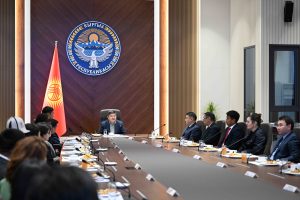Kyrgyz authorities marked the country’s Information and Press Day on November 7 with an old request: Less bad news, please.
Head of the Cabinet of Ministers Akylbek Japarov (no relation to President Sadyr Japarov) held a breakfast meeting with media representatives. According to a government readout of the meeting, Japarov stressed the important role of journalists “in shaping public opinion.”
“Despite the rapid development of technology and the introduction of artificial intelligence into our lives, the profession of a journalist remains important and irreplaceable,” he said. “Your job is not just transmitting information; it is creating context, analyzing events and presenting them in an accessible form for society.”
Kyrgyzstan recently put nearly a dozen journalists on trial and ordered the liquidation of Kloop, one of the country’s best investigative outlets. The country’s crackdown on media has been well documented.
A little later in the November 7 meeting, Japarov reportedly appealed to journalists to create a positive image of country, specifically for tourists.
“Let’s write about our country in a positive light and try to focus less on negative news,” he urged.
For Japarov, this is an old argument. Back in 2018, when he sat in parliament as part of the Bir Bol faction, Japarov suggested banning the publication of negative news in Russian. He cited a recent trip to Georgia where, he claimed, he didn’t see any bad news.
Japarov said that was by design: “It turned out that in 2004 the President of Georgia addressed the people and said: ‘Let’s write something bad in Georgian, and good in Russian and English.”
“And do you read our websites?” he went on. “There is news that a 92-year-old grandmother was raped. And it will be there for a week. Therefore, the minister must make an appeal. We need to praise the good and hide the bad.”
As RFE/RL’s Kyrgyz Service, Azattyk, reported, “In the run-up to [Information and Press Day], employees of independent media reported that they faced pressure from unknown people.” The report chronicled visits by people “who introduced themselves as employees of the State Committee for National Security” to the homes of two employees PolitKlinika earlier this week.
PolitKlinika Editor-in-Chief Dilbar Alimova told Azattyk:
They came to their place of registration, questioned relatives. They collected information about journalists and told them ‘not to interfere in politics.’ We do not interfere in politics. As journalists, we are just doing our job. We did not understand what happened. We contacted the Ministry of Internal Affairs and the State Committee for National Security, and they said they knew nothing. In addition, at the same time, an attack was carried out on the pages of our employees on social networks. We are very concerned about this. All this affects our work.
Yulia Kuleshova, a journalist with April TV, reported a similar visit in a Facebook post.
In October, Kyrgyzstan’s parliament, the Jogorku Kengesh, adopted a first reading of a draft law that would mandate fines for slander and insult on the internet and in the media. Like the 2021 false information law – which has been weaponized against Kloop most prominently – the proposed slander bill centers the Ministry of Culture as the arbiter of truth.
During an October 23 discussion of the bill, outspoken Deputy Dastan Bekeshev argued, “Citizens will lose many of their rights. We are transferring judicial powers to the Ministry of Culture. This is wrong.”
Supporters of the bill often remark on the responsibility that comes along with with the freedom of speech. Deputy Kamila Talieva said, “If someone speaks, they must provide facts so that they can respond. Every phenomenon has two sides. On the other hand, there should be no double standards.”
The demonstrated reality, however, is that Kyrgyzstan’s existing laws against insult and slander have been primarily used to sue media organizations for investigative reporting.
In 2020, former deputy customs chief Raimbek Matraimov took Azattyk and Kloop to court, accusing the outlets – which had reported extensively on Matraimov’s connection to a massive corruption scheme – of libel and seeking millions of soms in damages. The lawsuits were eventually withdrawn in April 2021 after Matraimov had been arrested, released after pleading guilty to corruption and paying a small fine, re-arrested and released again with the charges dropped.
In March 2024, Matraimov was once again arrested.
The lesson here is that what one side called “libel” was, in fact, well supported reporting. The civil court process lengthened the path between the accusation of libel and punishment, ultimately allowing time for the truth to bear out. Allowing the Ministry of Culture to issue fines at will shortens that path and will, arguably, speed punishment for journalists – the truth be damned.
In 2018, when Japarov suggested banning bad news in the interest of increasing tourism, I concluded: “Ultimately, it won’t be the lure of overly saccharine news that draws in visitors to Kyrgyzstan… Instead, simplifying procedures, improving infrastructure, and providing experiences tourists are seeking will bring them in. That would be the real good news.”
































